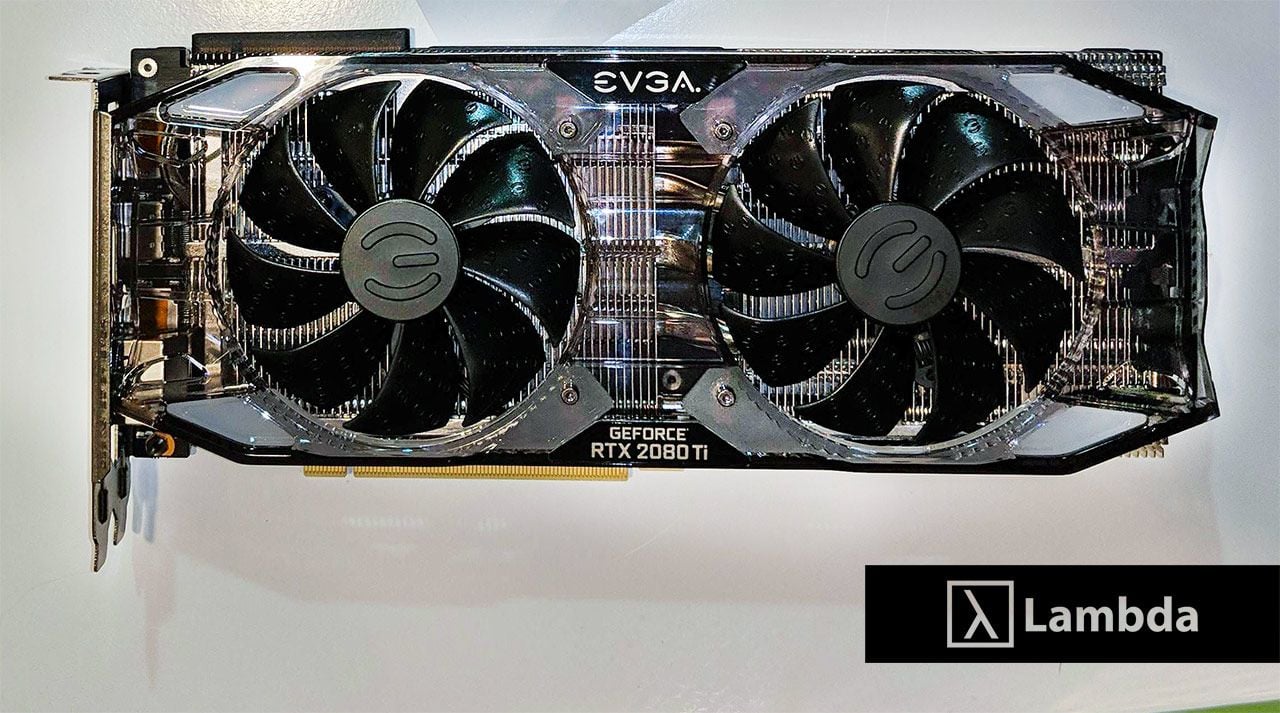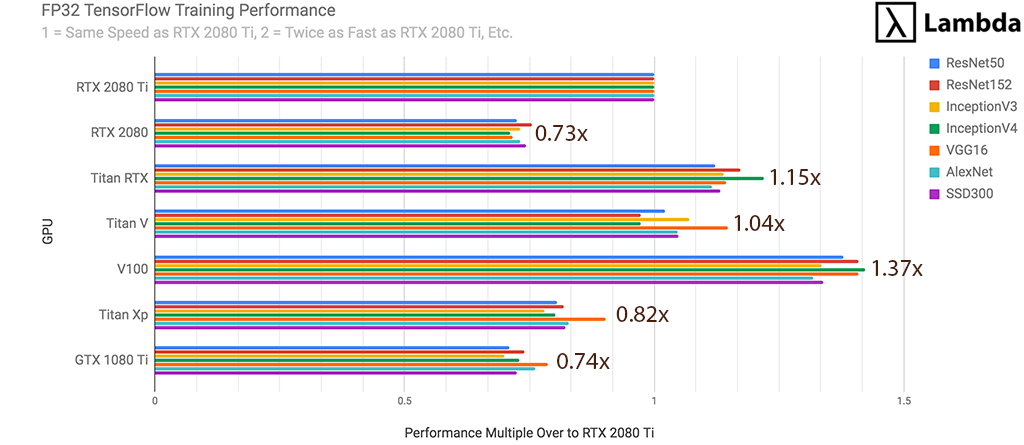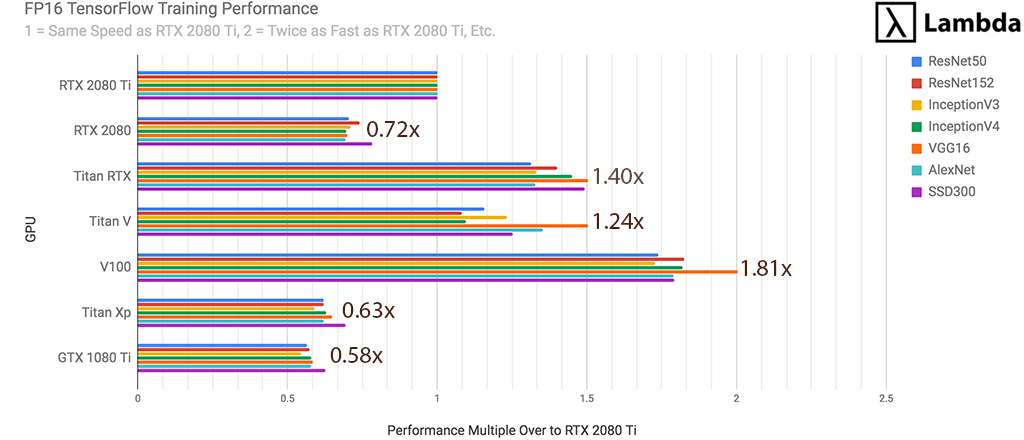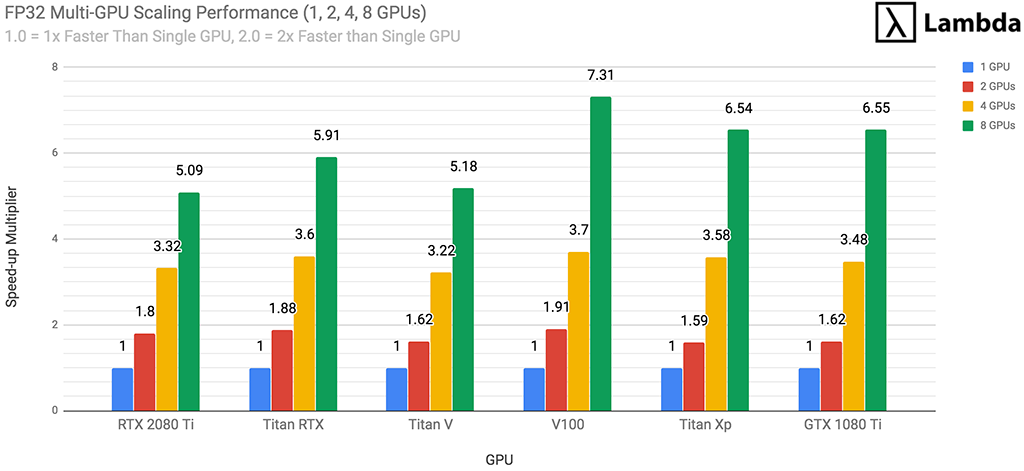RTX 2080 Ti Deep Learning Benchmarks with TensorFlow

In this post, Lambda discusses the RTX 2080 Ti's Deep Learning performance compared with other GPUs. We use the RTX 2080 Ti to train ResNet-50, ResNet-152, Inception v3, Inception v4, VGG-16, AlexNet, and SSD300. We measure # of images processed per second while training each network.
A few notes:
- We use TensorFlow 1.12 / CUDA 10.0.130 / cuDNN 7.4.1
- Single-GPU benchmarks were run on the Lambda's deep learning workstation
- Multi-GPU benchmarks were run on the Lambda's PCIe GPU server
- V100 Benchmarks were run on Lambda's SXM3 Tesla V100 server
- Tensor Cores were utilized on all GPUs that have them
RTX 2080 Ti - FP32 TensorFlow Performance (1 GPU)
For FP32 training of neural networks, the RTX 2080 Ti is...
- 37% faster than RTX 2080
- 35% faster than GTX 1080 Ti
- 22% faster than Titan XP
- 96% as fast as Titan V
- 87% as fast as Titan RTX
- 73% as fast as Tesla V100 (32 GB)
as measured by the # images processed per second during training.

RTX 2080 Ti - FP16 TensorFlow Performance (1 GPU)
For FP16 training of neural networks, the RTX 2080 Ti is..
- 72% faster than GTX 1080 Ti
- 59% faster than Titan XP
- 32% faster than RTX 2080
- 81% as fast as Titan V
- 71% as fast as Titan RTX
- 55% as fast as Tesla V100 (32 GB)
as measured by the # images processed per second during training.

FP32 Multi-GPU Scaling Performance (1, 2, 4, 8 GPUs)
For each GPU type (RTX 2080 Ti, RTX 2080, etc.) we measured performance while training with 1, 2, 4, and 8 GPUs on each neural networks and then averaged the results. The chart below provides guidance as to how each GPU scales during multi-GPU training of neural networks in FP32. The RTX 2080 Ti scales as follows:
- 2x RTX 2080 Ti GPUs will train ~1.8x faster than 1x RTX 2080 Ti
- 4x RTX 2080 Ti GPUs will train ~3.3x faster than 1x RTX 2080 Ti
- 8x RTX 2080 Ti GPUs will train ~5.1x faster than 1x RTX 2080 Ti

RTX 2080 Ti - FP16 vs. FP32
Using FP16 can reduce training times and enable larger batch sizes/models without significantly impacting the accuracy of the trained model. Compared with FP32, FP16 training on the RTX 2080 Ti is...
- 59% faster on ResNet-50
- 52% faster on ResNet-152
- 47% faster on Inception v3
- 34% faster on Inception v4
- 50% faster on VGG-16
- 38% faster on AlexNet
- 31% faster on SSD300
as measured by the # of images processed per second during training. This gives an average speed-up of +44.6%.
Caveat emptor: If you're new to machine learning or simply testing code, we recommend using FP32. Lowering precision to FP16 may interfere with convergence.
GPU Prices
- RTX 2080 Ti: $1,199.00
- RTX 2080: $799.00
- Titan RTX: $2,499.00
- Titan V: $2,999.00
- Tesla V100 (32 GB): ~$8,200.00
- GTX 1080 Ti: $699.00
- Titan Xp: $1,200.00
Methods
- For each model we ran 10 training experiments and measured # of images processed per second; we then averaged the results of the 10 experiments.
- For each GPU / neural network combination, we used the largest batch size that fit into memory. For example, on ResNet-50, the V100 used a batch size of 192; the RTX 2080 Ti use a batch size of 64.
- We used synthetic data, as opposed to real data, to minimize non-GPU related bottlenecks
- Multi-GPU training was performed using model-level parallelism
Hardware
- Single-GPU training: Lambda Quad - Deep Learning Workstation. CPU: i9-7920X / RAM: 64 GB DDR4 2400 MHz.
- Multi-GPU training: Lambda Blade - Deep Learning Server. CPU: Xeon E5-2650 v4 / RAM: 128 GB DDR4 2400 MHz ECC
- V100 Benchmarks: Lambda Hyperplane - V100 Server. CPU: Xeon Gold 6148 / RAM: 256 GB DDR4 2400 MHz ECC
Software
- Ubuntu 18.04 (Bionic)
- TensorFlow 1.12
- CUDA 10.0.130
- cuDNN 7.4.1
Run Our Benchmarks On Your Own Machine
Our benchmarking code is on github. We'd love it if you shared the results with us by emailing s@lambdalabs.com or tweeting @LambdaAPI.
Step #1: Clone Benchmark Repository
git clone https://github.com/lambdal/lambda-tensorflow-benchmark.git --recursive
Step #2: Run Benchmark
- Input a proper gpu_index (default 0) and num_iterations (default 10)
cd lambda-tensorflow-benchmark
./benchmark.sh gpu_index num_iterations
Step #3: Report Results
- Check the repo directory for folder <cpu>-<gpu>.logs (generated by benchmark.sh)
- Use the same num_iterations in benchmarking and reporting.
./report.sh <cpu>-<gpu>.logs num_iterations
Raw Benchmark Data
FP32: # Images Processed Per Sec During TensorFlow Training (1 GPU)
| Model / GPU | RTX 2080 Ti | RTX 2080 | Titan RTX | Titan V | V100 | Titan Xp | 1080 Ti |
|---|---|---|---|---|---|---|---|
| ResNet-50 | 294 | 213 | 330 | 300 | 405 | 236 | 209 |
| ResNet-152 | 110 | 83 | 129 | 107 | 155 | 90 | 81 |
| Inception v3 | 194 | 142 | 221 | 208 | 259 | 151 | 136 |
| Inception v4 | 79 | 56 | 96 | 77 | 112 | 63 | 58 |
| VGG16 | 170 | 122 | 195 | 195 | 240 | 154 | 134 |
| AlexNet | 3627 | 2650 | 4046 | 3796 | 4782 | 3004 | 2762 |
| SSD300 | 149 | 111 | 169 | 156 | 200 | 123 | 108 |
FP16: # Images Processed Per Sec During TensorFlow Training (1 GPU)
| Model / GPU | RTX 2080 Ti | RTX 2080 | Titan RTX | Titan V | V100 | Titan Xp | 1080 Ti |
|---|---|---|---|---|---|---|---|
| ResNet-50 | 466 | 329 | 612 | 539 | 811 | 289 | 263 |
| ResNet-152 | 167 | 124 | 234 | 181 | 305 | 104 | 96 |
| Inception v3 | 286 | 203 | 381 | 353 | 494 | 169 | 156 |
| Inception v4 | 106 | 74 | 154 | 116 | 193 | 67 | 62 |
| VGG16 | 255 | 178 | 383 | 383 | 511 | 166 | 149 |
| AlexNet | 4988 | 3458 | 6627 | 6746 | 8922 | 3104 | 2891 |
| SSD300 | 195 | 153 | 292 | 245 | 350 | 136 | 123 |